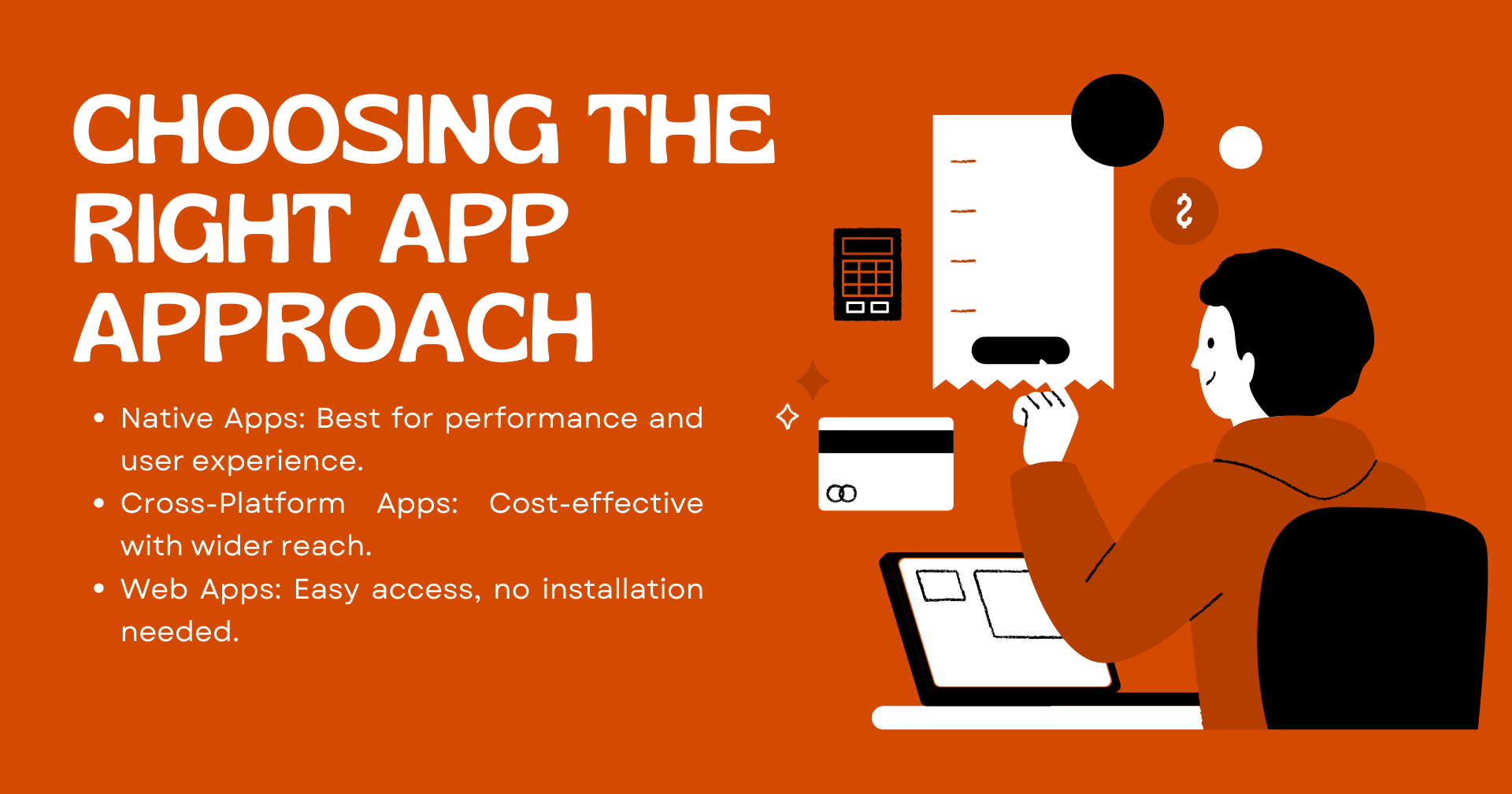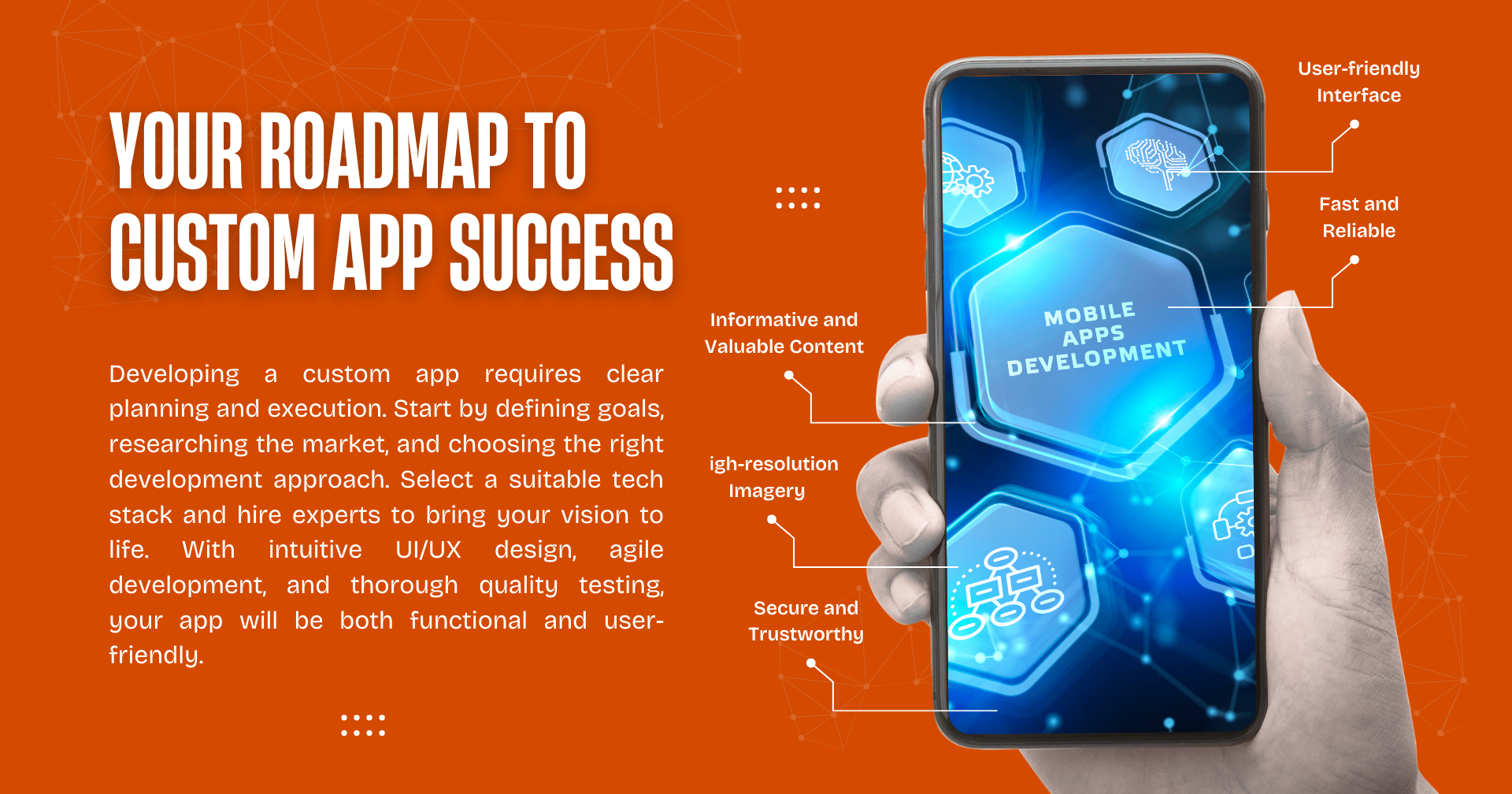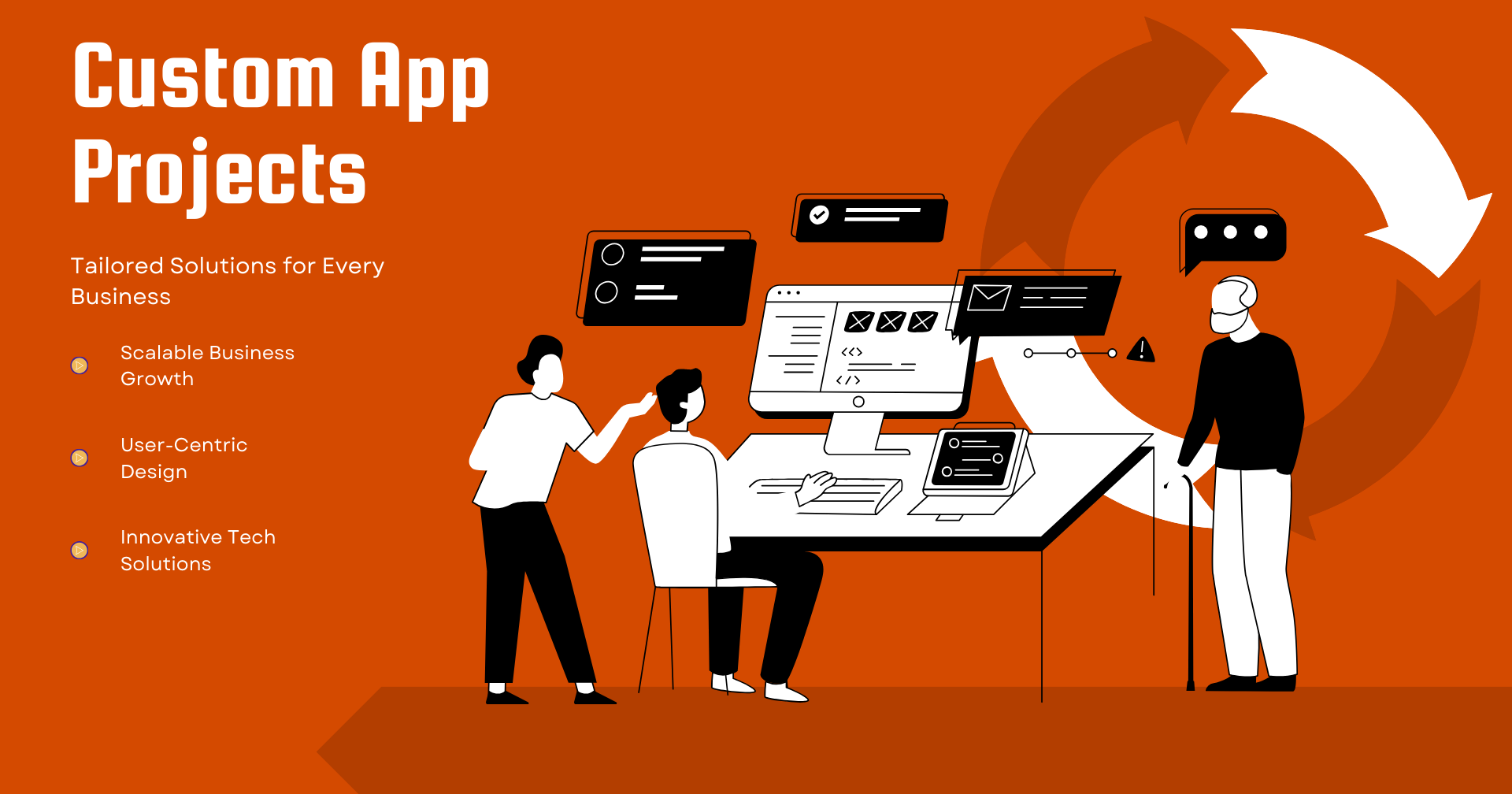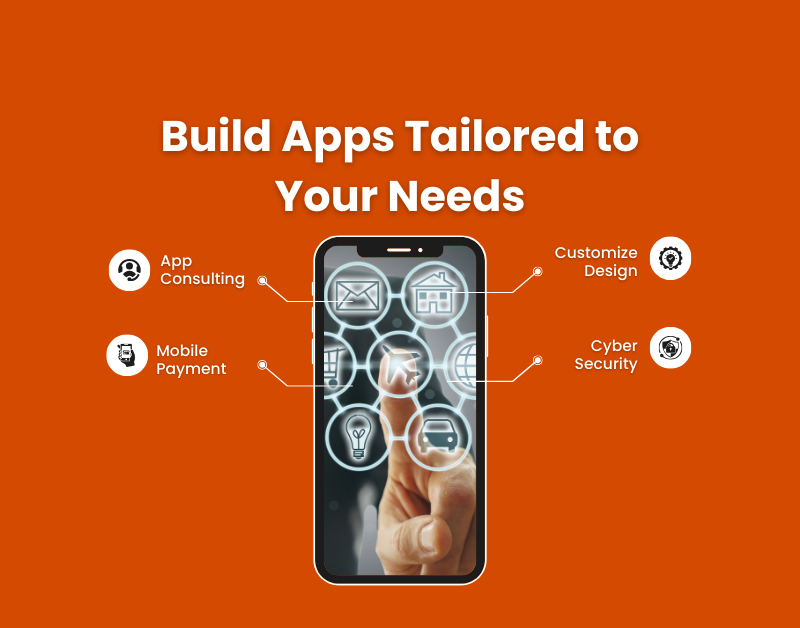Introduction
In today’s digital-first world, businesses, startups, and entrepreneurs are constantly seeking ways to engage their audience, streamline operations, and generate revenue. One of the most effective strategies is through custom app development. But what exactly does it mean? How does it work? What should beginners know before starting their app journey?
This guide will walk you through everything you need to know about custom app development, including its benefits, process, types, tools, costs, and future opportunities. Whether you’re interested in building a mobile app for your business or launching the next big fitness or fantasy sports app, this article will provide a solid foundation.
Introduction to Custom App Development Custom app development refers to designing and developing applications that are tailored to meet specific user requirements or solve unique business problems. Unlike off-the-shelf solutions, custom apps are built from scratch, ensuring they align with a brand’s functionality, design, and scalability goals.
Benefits of Custom App Development
Custom app development offers several advantages that go far beyond off-the-shelf solutions. One of the most significant benefits is the personalized user experience it delivers. When an app is tailored specifically to your audience, every feature, interface element, and workflow is designed with your users in mind. This leads to better usability, increased engagement, and higher satisfaction rates. Whether it’s a healthcare app that matches a clinic’s unique workflow or a fitness app tailored to a niche user group, personalization plays a major role in user retention—and custom app development ensures that personalization is implemented effectively.
Another major advantage is scalability. As your business grows, your app needs to grow with it. Custom app development creates solutions with scalability in mind, meaning you can add new features, expand user capacity, or adjust infrastructure without having to start from scratch. This flexibility supports long-term growth while minimizing downtime or disruptions to your services.
Integration is also smoother with custom apps. Many businesses rely on a variety of tools—CRM platforms, payment gateways, third-party APIs, or internal systems. Custom app development allows your app to seamlessly connect with these tools, ensuring all your data flows efficiently and securely across platforms. This leads to better productivity and reduces the risk of errors caused by data silos or manual processes.
Lastly, investing in a custom app development solution gives your business a distinct competitive advantage. Unlike pre-built apps, a custom application is uniquely designed to reflect your brand, offer exclusive features, and meet goals that generic tools simply can’t handle. This uniqueness not only attracts more users but also positions your product as a leader in your niche. In saturated markets like fitness, enterprise, or healthcare app development, being different—through custom app development—is often what drives success.
Understanding App Development
Native App Development:
- Built specifically for a single platform (iOS or Android).
- Offers the best performance and user experience.
- Tools include Swift for iOS and Kotlin or Java for Android.
Cross Platform App Development:
- Allows developers to write one codebase and deploy it across multiple platforms.
- Reduces development time and cost.
- Popular frameworks include Flutter, React Native, and Xamarin.
Web Apps:
- Run on browsers and are responsive to mobile devices.
- Require no installation and are ideal for content-heavy apps.

Types of Custom Apps
Healthcare App Development:
Custom healthcare apps are transforming the medical industry by improving how healthcare providers deliver patient care. These apps can offer features such as electronic health records (EHR), remote patient monitoring, prescription tracking, and appointment scheduling. With the rise of telemedicine and HIPAA-compliant app solutions, doctors and patients can now connect from anywhere. Custom app development in the healthcare sector ensures that these solutions are tailored to specific clinical workflows, regulatory standards, and patient needs. Healthcare mobile app development companies are also integrating AI to assist with diagnostics and treatment plans, making the entire experience more efficient, secure, and patient-centered through the power of custom app development.
Enterprise App Development:
Enterprise-level apps are built to meet the unique needs of a company’s internal processes. These applications are designed to increase efficiency, enable real-time data sharing, and improve communication across departments. They often include functionalities like employee management, workflow automation, data analytics, and secure access control.
Custom app development plays a crucial role in building these enterprise-level solutions, ensuring they are aligned with specific business workflows and compliance requirements. Custom enterprise app development allows organizations to replace outdated systems with modern, scalable solutions tailored to their operations and goals, while also enabling seamless integration with existing tools and technologies.
Fitness App Development:
The fitness industry has seen a surge in mobile apps that help users lead healthier lives. These apps can include workout routines, step tracking, calorie counters, sleep monitors, and personalized fitness plans. Many fitness app development companies now integrate wearable device compatibility, live classes, and community challenges to boost engagement. By offering tailored health insights and gamified features, custom app development enables fitness brands to create unique, user-focused solutions that stand out in the market. These custom apps keep users motivated and accountable on their wellness journey while providing scalable options for adding new features and technologies over time.
Fantasy Sports App Development
Fantasy sports apps have grown into a booming niche, with millions of active users creating virtual teams based on real-life players. Users track live game statistics, compete in leagues, and win prizes. New trends in fantasy sports app development include real-time score updates, push notifications, Augmented Reality (AR) features for immersive experiences, and advanced analytics for team building. These platforms are also becoming more social, allowing friends and fans to interact, challenge each other, and build communities around their favorite sports.
With the help of custom app development, businesses can design unique features, personalized user interfaces, and scalable solutions tailored to specific sports audiences. As the market expands, companies are increasingly turning to custom app development to deliver innovative, engaging, and highly interactive fantasy sports experiences that keep users coming back season after season.
Steps to Develop a Custom App
- Define Your Goals and Requirements: Understand the problem you want to solve, target audience, key features, and app objectives.
- Market Research: Analyze competitor apps, study user reviews, and identify feature gaps.
- Choose Your Development Approach: Decide between native, web, or cross platform app development services based on budget, time, and performance needs.
- Select the Right Tech Stack: Pick programming languages, frameworks, and tools aligned with your goals. Refer to top 10 programming frameworks for app development.
- Hire an Expert Team: Consider partnering with an android app development agency, ios app development company, or mobile app development consulting service.
- Design the UI/UX: Create intuitive, engaging, and responsive interfaces using wireframes and design tools.
- Start Development: Follow agile methodology and build the app in sprints, testing along the way.
- Quality Assurance: Conduct usability tests, performance tests, and bug fixing.
- Launch: Deploy your app on app stores and monitor feedback.
- Post-Launch Support: Regular updates, feature enhancements, and customer support are vital.

Key Features
- Smooth user experience
- Fast load times
- Offline functionality (when required)
- Strong data security protocols
- Analytics for performance tracking
- Third-party integration
How to Develop an App and Make Money
- In-App Advertising
- Freemium Model (free basic features, paid premium features)
- Subscription Services
- Paid App Downloads
- Affiliate Marketing
- Sponsorships and Partnerships
App Development Framework
Choosing the right app development framework is a critical step in building a successful mobile application. The framework you select determines not only how your app will be developed but also its performance, scalability, and long-term maintenance. App development frameworks provide pre-built components, libraries, and tools that simplify the development process, making it faster and more efficient.
There are three main types of frameworks used in mobile app development: native, cross-platform, and hybrid. Native frameworks, such as Swift for iOS and Kotlin for Android, allow developers to build apps optimized for a specific platform. These apps tend to offer the best performance, smoother animations, and full access to device hardware. Native development is ideal for complex apps that require high performance or heavy computational tasks.
Cross-platform frameworks, including React Native, Flutter, and Xamarin, enable developers to write a single codebase that works on both iOS and Android. This approach reduces development time and costs while maintaining near-native performance. Cross-platform frameworks are particularly useful for startups or businesses looking to launch on multiple platforms quickly without compromising user experience.
Hybrid frameworks, like Ionic or PhoneGap, combine web technologies such as HTML, CSS, and JavaScript to create mobile apps that run inside a native container. While hybrid apps are easier to develop and maintain, they may not offer the same performance or responsiveness as native or cross-platform apps. They are often used for simpler applications or internal business tools.
Choosing the right framework also depends on your app’s complexity, budget, timeline, and required features. For example, apps that rely heavily on animations, AR/VR, or complex integrations may benefit more from native frameworks. On the other hand, apps targeting a broad audience across multiple platforms might be better suited for cross-platform solutions.
Frameworks also play a key role in long-term maintenance and scalability. Using a popular and well-supported framework ensures access to regular updates, community support, and pre-built modules, making it easier to add features or improve performance over time.
Ultimately, selecting the right app development framework is a strategic decision that affects every stage of your app’s lifecycle. From initial design to coding, testing, and post-launch optimization, the framework provides the foundation for creating a high-quality, responsive, and scalable mobile application that meets both user expectations and business objectives.
- Consider app complexity and performance needs
- Check compatibility with iOS and Android platforms
- Evaluate community support and documentation
- Prioritize scalability and long-term support
- Look at integration options with APIs and databases
Cost Factors in App Development
- Type and complexity of the app
- Platform (iOS, Android, or cross-platform)
- UI/UX design depth
- Number of integrations and third-party services
- Location and experience level of the development team
- Ongoing maintenance and updates
Custom App Projects
- Start with a clear MVP (Minimum Viable Product)
- Allocate time for market research
- Focus on user-centric design
- Test early and often
- Work with experienced app developers
- Plan for ongoing support and updates

Cost of Custom App Development
App development costs vary based on complexity, platform, and features.The cost of custom app development can vary widely depending on several factors, including the complexity of the app, the number of platforms it will run on, and the specific features required. A simple mobile app with basic functionality may start at a few thousand dollars, making it accessible for small businesses or startups. These apps typically include standard user interfaces, limited backend integrations, and straightforward navigation.
However, as the complexity of the app increases, so does the cost. Applications with advanced features, such as real-time messaging, payment gateways, geolocation services, or AI-powered functionalities, require more development time, technical expertise, and testing. Enterprise-level solutions or apps designed for highly regulated industries, such as healthcare or finance, may demand even higher investments due to compliance requirements, security measures, and scalability considerations.
Engaging a specialized mobile app development company can also affect costs. Agencies with experience in niche industries, like healthcare mobile app development company offerings, may charge higher fees but provide added value in terms of compliance knowledge, security protocols, and industry-specific functionality. The expertise and quality assurance provided by these teams can justify the additional investment.
In addition to mobile apps, businesses may consider custom web app development. Web applications are browser-based and designed to work across desktops, laptops, and responsive web interfaces. Examples include customer relationship management (CRM) systems, data analytics dashboards, booking platforms, and e-commerce tools. Custom web apps are tailored to specific business needs, allowing companies to streamline internal processes, enhance operational efficiency, and improve user experience.
The development process for web apps shares similarities with mobile app development, including planning, prototyping, coding, testing, and deployment. However, web apps may require additional considerations, such as cross-browser compatibility, responsive design, server-side optimization, and cloud hosting solutions. These factors can influence both the time and cost required for development.
Ongoing maintenance and updates should also be factored into the overall budget for custom app development. Even after launch, apps require regular updates to fix bugs, improve performance, and introduce new features. For mobile apps, this may include adapting to new operating system updates, security patches, and evolving user expectations. Similarly, web apps need continuous monitoring, server maintenance, and occasional feature enhancements to remain effective.
It’s important for businesses to request detailed quotes and project timelines before starting custom app development. Transparent discussions with developers about features, timelines, post-launch support, and potential challenges help prevent unexpected costs and ensure that the final product aligns with both business goals and budgetary constraints.
Ultimately, investing in custom app development—whether mobile or web-based—offers tailored solutions that meet unique business needs. By understanding the factors that influence cost, planning carefully, and partnering with experienced developers, businesses can create applications that deliver long-term value, improve efficiency, and enhance customer satisfaction.
programming languages used in custom App
- Swift (for iOS apps)
- Kotlin and Java (for Android apps)
- JavaScript (for cross-platform apps with frameworks like React Native)
- Dart (Flutter)
Trends in Custom App Development
- Integration of AI and machine learning
- Increased use of AR/VR in gaming and shopping apps
- Demand for personalized experiences in healthcare and fitness apps
- Blockchain for secure transactions and identity management
- Expansion of cross-platform tools
- Growing influence of no-code/low-code platforms
Conclusion
Custom app development is far more than just writing code—it’s a strategic process designed to solve real-world problems, enhance user engagement, and create scalable, long-lasting digital solutions. Unlike off-the-shelf applications, custom apps are tailored to the unique requirements of a business, allowing organizations to stand out and deliver exceptional value to their customers.
Businesses across various industries—whether healthcare, fitness, retail, or enterprise—are increasingly turning to custom app development to address needs that generic software cannot fulfill. For example, a healthcare mobile app can provide secure patient data access, appointment scheduling, teleconsultation capabilities, and integration with electronic medical records. By aligning with clinical workflows, these apps improve operational efficiency and patient experience.
In the enterprise sector, custom applications help automate internal processes, streamline communication, and provide real-time analytics for informed decision-making. Custom app development ensures that businesses have tools that adapt to their workflow rather than forcing the organization to adapt to generic software. This flexibility can significantly increase productivity and reduce operational bottlenecks.
The fitness industry also benefits greatly from tailored mobile solutions. Custom apps can include personalized workout plans, AI-based coaching, integration with wearable devices, community forums, and progress tracking. These features enhance user engagement, increase retention, and open opportunities for monetization through subscription plans, premium features, or in-app purchases.
Custom app development also provides complete control over the app’s design, functionality, and integration capabilities. Businesses can prioritize user experience, design intuitive interfaces, and implement features that align perfectly with their brand identity. Additionally, such apps allow better data security and compliance with regulatory standards like HIPAA, GDPR, or industry-specific guidelines.
Technological advancements, including no-code and low-code platforms, have further democratized custom app development. Even businesses with limited technical resources can now collaborate with developers or consultants to build applications efficiently. Cross-platform frameworks also allow apps to function seamlessly on both iOS and Android, reducing development time and costs while maximizing reach.
Ongoing maintenance and iterative updates are another critical advantage of custom app development. Developers can monitor performance, address bugs, introduce new features, and adapt to changing user expectations or market trends. This ensures the app remains relevant, secure, and capable of supporting long-term business growth.
The journey from idea to launch in custom app development may seem complex, but with the right development partner or consulting firm, it becomes structured, manageable, and highly goal-oriented. A professional approach includes thorough planning, market research, prototyping, rigorous testing, and post-launch optimization to guarantee success.
Ultimately, investing in custom app development empowers businesses to create applications that are innovative, adaptable, and perfectly aligned with organizational objectives. Whether for a startup seeking to disrupt the market or an established enterprise aiming to modernize operations, custom apps provide a strategic advantage that off-the-shelf solutions cannot match.
By embracing custom app development, businesses can deliver exceptional digital experiences, foster deeper customer relationships, and unlock new revenue streams, ensuring long-term growth and competitive success in an increasingly mobile-first world.


